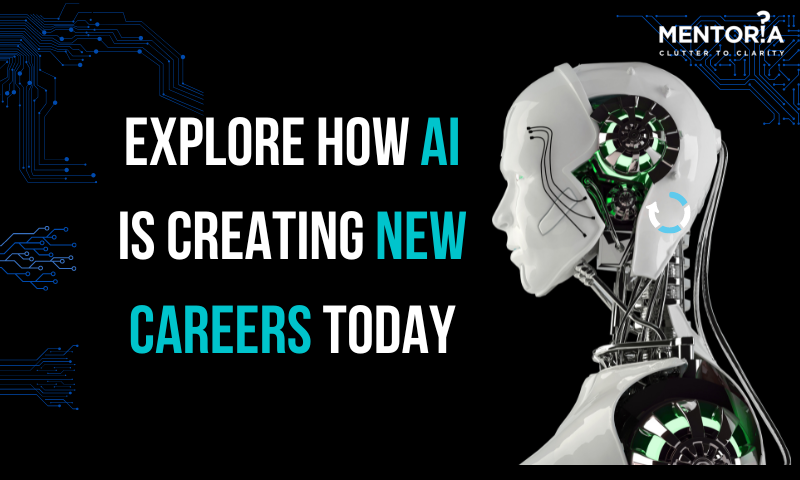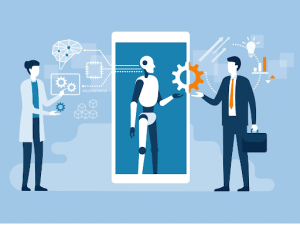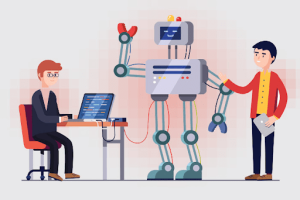Explore How AI Is Creating New Careers Today

If you have been following the news or scrolling through Instagram, then you know that Artificial Intelligence is trending. Are you one of those people who fear that robots and AI will soon take over the world and leave us humans jobless? Well, hold on to your hats, because that’s not it, we’ve got some good news for you!
The rise of AI is not just about doom and gloom – it’s also about creating a host of new, funky and creative careers that you may have never even heard of. And the notion of AI taking over humans completely is a common sci-fi trope, but in reality, it’s doubtful. After all, have you ever tried to get a robot to fold laundry properly? It’s not an easy task when it comes to getting your robot to do human-like tasks. So put down the tin foil hat and read on to discover the unexpected job opportunities that the AI revolution brings.
How Is Artificial Intelligence Fetching More Opportunities?
From machine learning engineers to AI business strategists, the advancements in AI are opening up a world of possibilities. These careers offer a chance to innovate, shape the future, and solve complex problems using cutting-edge technology.
If you’re interested in the field of AI and want to make a positive impact on the world, then these careers may be just what you’re looking for. So, let’s dive in and see what AI has in store for us!
The primary responsibility of a data scientist is to analyse massive databases for patterns and insights that might guide business choices. The creation and use of AI models are now part of a data scientist’s job description due to the rise of artificial intelligence (AI). Today, choosing relevant algorithms, building models, and performing optimisation fall under the purview of data scientists. Technology, finance, healthcare, and retail are just sectors where data scientists might find employment. They can conduct research and create new AI technologies while working in academia or governmental environments.
Data Science is a lucrative field with a high demand for qualified experts and room for career progression.
These engineers are like the “architects” of the AI world. They help design and build the systems that make our lives easier and smarter.
Software engineering and data science abilities are combined in the job of an AI engineer. They must be proficient in programming languages like Python and knowledgeable about artificial neural networks and machine learning algorithms. They also need to be knowledgeable in distributed systems and cloud computing and have experience working with massive datasets.
Depending on the company, an AI engineer’s role has different responsibilities. They might be in charge of a small startup’s entire AI development process and in a bigger company, they might function as a team, concentrating on particular jobs like model deployment or infrastructure management.
These engineers are like the “teachers” of the AI world. They help machines learn from data, making communication between humans and machines as smart as a whip.
The responsibilities of a machine learning engineer include creating and integrating ML models into practical applications. The need for machine learning engineers will keep rising as ML is increasingly incorporated into other businesses. Overall, the development of AI and ML has increased the demand for machine learning engineers, who are essential to the creation and application of ML models.
In the domain of AI, these engineers serve as the “eyes.” They make communication between humans and machines as clear as a sunny day by assisting robots in comprehending and processing visual input.
Designing, creating, and implementing computer vision algorithms and models to extract information from visual input are all part of a computer vision engineer’s job description. Technology, transportation, retail, and healthcare are just a few industries where computer vision engineers can find employment. Overall, the rise of AI and computer vision has created job opportunities for Computer Vision Engineers, who play a critical role in the development and deployment of computer vision systems.
These engineers are like the “translators” of the AI world. They help machines understand and process human language, making communication between humans and machines seamless and effortless. And let’s be honest, who wouldn’t want to be a part of that revolution?
The work of a natural language processing engineer entails creating, testing, and implementing NLP models and algorithms for the processing and analysis of human language. They must be knowledgeable in text classification, sentiment analysis, and machine translation, among other NLP approaches. Natural language processing engineers, who are essential to the creation and implementation of NLP systems, now have more employment prospects as AI and NLP become more prevalent.
In the world of AI, these engineers are comparable to “Jedi masters.” They contribute to the creation of robots that can do anything from making coffee to saving the world.
Robotics engineers are in charge of planning, creating, and testing machines that can work alone or with little assistance from humans. Given the expanding demand for automation across many industries, there are numerous opportunities for robotics engineers.
Robotics experts that are well-versed in AI may also create new AI-powered robots that are capable of carrying out challenging jobs, creating new avenues for advancement and innovation in the industry.
With AI, we can now teach computers to do things like recognize our faces, speak like us, and even create art! That’s right, deep learning engineers get to play with AI and make it do amazing things.
Deep learning engineers are responsible for designing, building, and deploying deep neural networks for tasks such as image and speech recognition, natural language processing, and predictive analytics. The scope for deep learning engineers is vast as AI is applied in many industries.
AI creates job opportunities for AI Product Managers by allowing them to be the masterminds behind the next big thing! There is a growing need for knowledgeable AI Product Managers as AI continues to reshape and transform our environment. These brilliant thinkers are in charge of conceptualising and creating ground-breaking AI solutions that improve our quality of life and make it easier, cooler, and more connected.
With potential in sectors including healthcare, finance, transportation, and more, the scope for AI product managers is vast. AI Product Managers have a variety of responsibilities, whether they are employed by a tech startup, a large organisation, or a research institution. These responsibilities range from creating product strategy to collaborating with cross-functional teams to realise their vision.
By enabling AI Business Strategists to completely transform the way business is done, AI is opening up new career prospects for them. With prospects in practically every industry imaginable, the potential for AI business strategists is enormous. They may work for start-ups, big businesses, consulting organisations, and more. AI Business Strategists get to be at the cutting edge of innovation wherever they work, leveraging their business knowledge and creativity to create success and actually change the world.
By creating and carrying out strategic plans that use AI to address business problems and open up new opportunities, AI business strategists are the ones who make AI visions a reality.
With the rise of AI, chatbots are becoming more and more prevalent, and the demand for experts who can build these conversational robots is growing by the day. Chatbot Developers are the ones who bring these bots to life, using their technical skills and creativity to design, build, and deploy chatbots that can answer questions, provide support, and even entertain.
The scope for Chatbot Developers is huge, with opportunities in industries such as customer service, e-commerce, healthcare, and more.
With growing AI, there is a need for people who can work on the back end as well, right? AI Technical Writers are the ones who turn technical jargon into understandable, engaging, and inspiring content that helps people understand and appreciate the power of AI.
They can work in tech startups, consulting firms, and even large corporations that are looking to educate their customers and employees about AI.
By enabling AI Sales and Marketing Specialists to market the future, AI is opening up job prospects for them! The need for professionals who can promote and sell cutting-edge AI products and solutions is increasing daily as a result of the rise of AI. By creating and putting into practice sales and marketing strategies that foster growth and success, AI Sales and Marketing Specialists are the ones who make AI aspirations become commercial realities.
These are just some of the many job opportunities that AI is creating. In all seriousness, AI is designed to augment and assist human decision-making, not completely replace us. So, rest easy knowing that there’s a good chance we’ll still have our jobs (with more opportunities)… and the robots will just be stuck folding our laundry.
Make Your Own Career in AI
If you think that any of the above-mentioned careers is an interesting option for you then what are you waiting for? AI is the future so do not hesitate. If you need help with choosing what career is the best for you, and what are your own strengths and limitations then we are here for you!
When confusion has you down, Mentoria can help you find clarity. Our 4-step career guidance solution, helps us find the right career fit for you from 3 streams, 850+ courses & 12,000+ careers.












